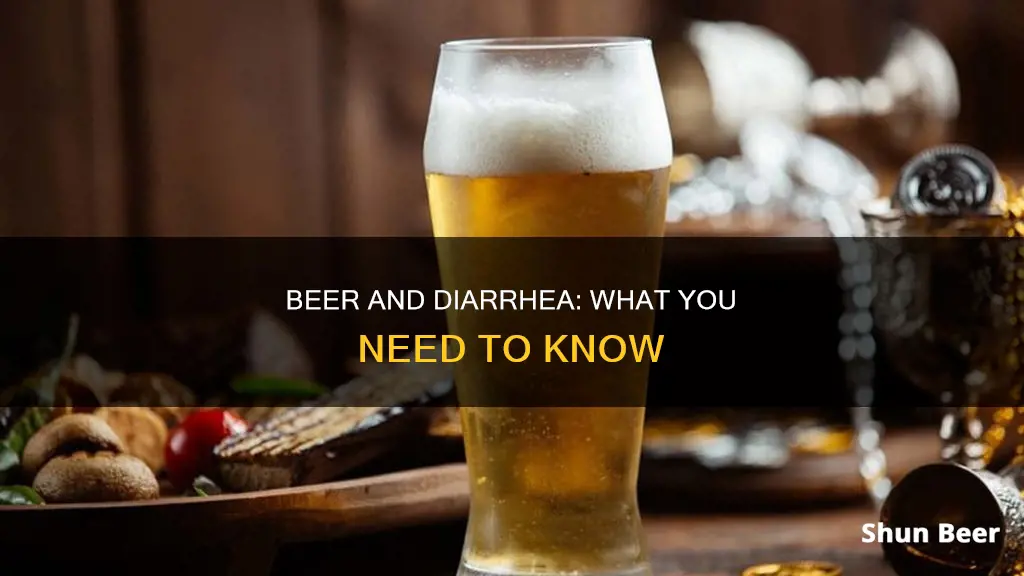
Alcohol can cause diarrhea due to its irritating effect on the gut and intestines. Ethanol, found in beer and other alcoholic drinks, irritates the gut, increases intestinal contractions, and speeds up digestion. This leaves less time for the colon to absorb water, resulting in watery stools. Alcohol can also kill off good bacteria in the gut, leading to an overgrowth of bad bacteria and further impairing water absorption. Beer, in particular, contains high levels of carbohydrates, which can enter the large intestine without being fully broken down, leading to gas, bloating, and diarrhea. While occasional diarrhea after drinking beer may not be a cause for concern, persistent diarrhea or accompanying symptoms such as dehydration, bleeding, or abdominal pain may warrant medical attention.
What You'll Learn

Beer and malt liquor are worse for diarrhoea than other alcoholic drinks
Drinking alcohol can have a noticeable impact on your digestive system, and in some cases, it can cause diarrhoea. While any alcoholic drink can potentially lead to diarrhoea, beer and malt liquor are particularly likely to do so. This is due to the high volume of carbohydrates they contain, which can be difficult for the body to break down.
Alcohol affects the digestive system in several ways, which can lead to diarrhoea. Firstly, it can irritate the lining of the intestines, causing them to leak fluid and increasing the frequency and strength of muscle contractions. This can result in waste being pushed out before the intestines have had a chance to absorb enough water, leading to loose and watery stools.
Additionally, alcohol can disrupt the balance of bacteria in the gut, leading to an overgrowth of harmful bacteria. This can further impair the intestines' ability to absorb water and contribute to diarrhoea. Alcohol can also stimulate the production of stomach acid, which can mix with the stool and worsen the problem.
Beer and malt liquor contain a high volume of complex carbohydrates. Usually, the body produces enough enzymes to break these down when they reach the small intestine. However, when large amounts of beer or malt liquor are consumed, the accelerated digestive process caused by the ethanol in alcohol can mean that some of these carbohydrates pass into the large intestine without being fully broken down.
Once in the large intestine, bacteria feed on these remaining carbohydrates, leading to increased gas, cramping, and diarrhoea. Therefore, while any alcoholic drink can potentially cause diarrhoea, beer and malt liquor are particularly likely to do so due to their high carbohydrate content and the way this interacts with the effects of ethanol on the digestive system.
How to reduce the risk of alcohol-induced diarrhoea
If you want to reduce the risk of alcohol-induced diarrhoea, it is important to drink in moderation and stay hydrated by alternating alcoholic drinks with water. If you find that high-carb drinks tend to cause digestive issues, switching to something low-carb or low-sugar, such as a single malt, may also help.
Beer Cans: Safe Drinking Vessels?
You may want to see also

Alcohol can irritate the gut lining, causing watery stools
If these contractions are too strong or frequent, they can push stool out of the body before the intestines have had the chance to absorb water from it. This can result in watery stools. In addition, the irritation caused by alcohol can impair the intestines' ability to absorb fluid, leaving stool in a dehydrated state.
The irritation caused by alcohol can also disrupt the balance of bacteria in the gut, leading to a higher concentration of harmful bacteria. This can further impair the intestines' ability to absorb water and contribute to watery stools.
To reduce the risk of watery stools after drinking beer or other alcoholic beverages, it is recommended to drink in moderation, stay hydrated, and avoid heavy foods and caffeine while drinking.
The Magic of Beer: Trapping Pests with Fermentation
You may want to see also

Drinking alcohol can lead to an imbalance of bacteria in the gut
Drinking alcohol can have a detrimental effect on the balance of bacteria in the gut. The gut microbiome is a diverse community of microorganisms that play a crucial role in maintaining overall health and wellness. While moderate alcohol consumption may offer some health benefits, excessive drinking can disrupt the delicate balance of microorganisms in the gut, leading to a range of issues.
Firstly, alcohol can kill off beneficial bacteria in the gut, leading to an imbalance of "good" and "bad" bacteria. This imbalance, known as dysbiosis, is associated with increased inflammation and disease risk. Specifically, alcohol consumption can lead to a decrease in beneficial bacteria such as Akkermansia, Roseburia, Faecalibacterium, and Bacteroides, and an increase in opportunistic pathogens. This shift in the gut microbiome can impair the intestines' ability to absorb water, leading to diarrhoea.
Secondly, alcohol can increase intestinal permeability, also known as a "leaky gut". A healthy gut lining acts as a barrier between the intestine and the rest of the body, controlling what substances can pass into the bloodstream. Excess alcohol consumption can weaken this barrier, allowing unwanted substances, including microbes, to enter the bloodstream. This can further impair the body's ability to absorb water and contribute to diarrhoea.
Thirdly, alcohol can stimulate the production of acid in the stomach, which can irritate the lining of the intestines and contribute to diarrhoea. Alcohol can also affect the normal functions of the digestive system at every stage, including water absorption and digestion speed.
Finally, alcohol can impact the production of antimicrobial molecules in the gut, reducing the body's ability to fight off intestinal pathogens. This can lead to an overgrowth of bacteria in the small intestine and further contribute to an imbalance of bacteria in the gut.
Overall, while moderate alcohol consumption may have some benefits, excessive drinking can disrupt the balance of bacteria in the gut, leading to a range of health issues, including diarrhoea. It is important to drink in moderation and support gut health through hydration, probiotics, prebiotics, and a balanced diet.
Beer and Headaches: Is There a Link?
You may want to see also

Drinking on an empty stomach can cause diarrhoea
If these contractions are in overdrive, they might be pushing your faeces out before your intestines have the chance to absorb extra water from your waste. The result is that you may be defecating loose, watery stools before they are well-formed.
On top of this, irritated intestines may have trouble doing their usual job of absorbing fluid when you're drunk, leaving your faeces in its pre-dehydrated state. This can lead to a triple whammy of too much fluid exiting, too little being absorbed, and the gut working overtime to push things out.
The source of your diarrhoea may extend beyond intestinal irritation, too. Alcohol can kill off the good bacteria in your gut, which could alter the balance of the bugs, leading to a higher concentration of bad bacteria. That's a problem, as too many of the bad guys can further impair your intestines' ability to absorb water. What's more, too much alcohol can also stimulate the production of acid in your stomach—yet another fluid mixed in with the stool.
If you want to avoid alcohol-induced diarrhoea, start by keeping your drinking in check: stick to the daily recommended limit of no more than two drinks a day. The more you drink, the worse the diarrhoea. Then make sure to alternate each alcoholic drink with plain water, too. Staying hydrated can help dilute the alcohol in your system, making its effects less pronounced.
Cold Weather, Warm Beer: Should You Drink It?
You may want to see also

Alcohol can cause inflammation in the gut
Drinking alcohol can have a negative impact on your gut health. Alcohol can cause inflammation in the gut, which can lead to a range of gastrointestinal issues. Here are some key points to understand this topic:
Alcohol and Gut Inflammation
Alcohol and its metabolites can overwhelm the gastrointestinal tract and liver, leading to damage and inflammation. This inflammatory response creates a cycle that exacerbates alcohol-induced organ damage and contributes to various deleterious effects, both locally and systemically.
Mechanisms of Alcohol-Induced Inflammation
- Intestinal Microbiota: Alcohol alters the balance of bacteria in the gut, leading to "dysbiosis" and bacterial overgrowth. This increases the release of endotoxins, which promote inflammation.
- Intestinal Hyperpermeability: Alcohol disrupts the intestinal barrier, increasing its permeability and allowing pathogens and toxins to enter the bloodstream. This "leaky gut" can lead to local and systemic inflammation.
- Mucosal Immunity: Alcohol affects intestinal mucosal immunity, decreasing the innate immune response and triggering an inflammatory response, including the release of inflammatory immune cells.
Health Risks Associated with Alcohol-Induced Gut Inflammation
- Liver Disease: Alcohol-induced gut inflammation contributes to liver injury by increasing intestinal permeability and the entry of gut-derived endotoxins into the liver. This can lead to conditions such as alcoholic fatty liver disease, liver failure, liver cancer, or cirrhosis.
- Neuroinflammation: Alcohol-induced intestinal permeability and endotoxins can influence psychological and cognitive function, potentially contributing to symptoms of alcohol withdrawal and driving changes in the central nervous system.
- Gastrointestinal Cancers: Chronic alcohol consumption increases the risk of gastrointestinal cancers, including cancer of the esophagus, stomach, and colon. Alcohol-induced gut inflammation may be a key factor in alcohol-related carcinogenesis.
- Inflammatory Bowel Disease (IBD): Alcohol consumption can influence the course of IBD through associated gut inflammation, triggering flare-ups and increasing disease activity.
Preventing and Treating Alcohol-Induced Gut Inflammation
Moderate alcohol consumption is generally considered safe and is unlikely to cause gut problems. However, excessive drinking can lead to gut inflammation and related health issues. To prevent or treat alcohol-induced gut inflammation:
- Reduce or eliminate alcohol consumption.
- Eat a healthy diet rich in prebiotics and probiotics to support a healthy gut microbiome.
- Stay hydrated by drinking enough water, especially when consuming alcohol.
- Consult a healthcare professional if you experience persistent digestive issues or other concerning symptoms.
Is Week-Old Beer Safe to Drink?
You may want to see also
Frequently asked questions
It is generally not recommended to drink beer or any other alcoholic beverage after experiencing diarrhea, as alcohol can irritate the lining of the intestines and disrupt the gut microbiome, leading to further digestive issues.
Beer contains high levels of carbohydrates, which can be difficult for the body to break down, especially when consumed in large quantities. This can lead to gas, bloating, and diarrhea.
It is recommended to wait until your digestive system has returned to normal, which can take a few days to a few weeks, depending on the severity of the diarrhea and the frequency of alcohol consumption.
It is recommended to drink plenty of water or other non-alcoholic beverages to stay hydrated and help with digestion.
It is recommended to eat a well-balanced meal with fiber and avoid spicy, highly seasoned, dairy, greasy, or fried foods, as well as caffeinated beverages. Probiotics may also be helpful in restoring gut health.







